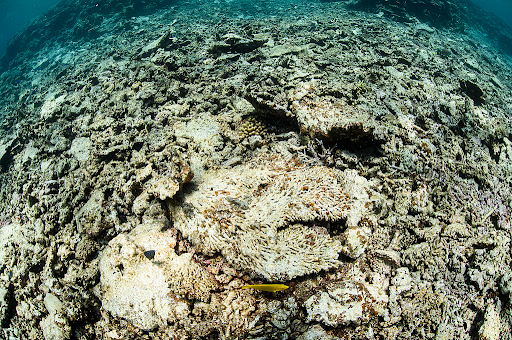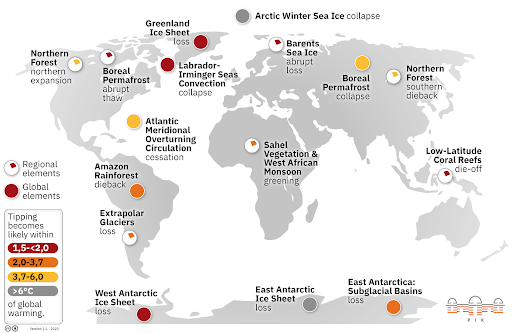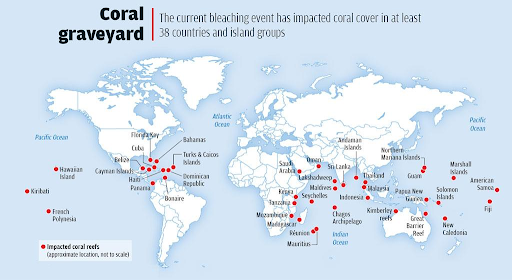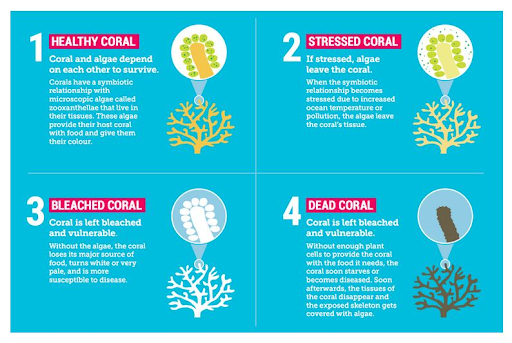



Earth has crossed its first climate tipping point, causing irreversible mass dieback of warm-water coral reefs. Record ocean temperatures have triggered historic bleaching, threatening marine life and human livelihoods, signaling urgent global action to reduce emissions and prevent cascading ecological disasters.

Copyright infringement not intended
Picture Courtesy: DOWNTOEARTH
According to the Global Tipping Points report, warm-water coral reefs have crossed their thermal tipping point and are facing unprecedented dieback.
The Global Tipping Points report, compiled by 160 scientists, has delivered a stark warning: Earth has entered a dangerous "new reality" as the first major climate tipping point has been triggered.
What is a Climate Tipping Point?It is a critical threshold that, when crossed, leads to large, irreversible, and self-accelerating changes in parts of the Earth's climate system. The mechanism behind a tipping point is a positive feedback loop. In such a loop, a warming-induced change sets off a chain reaction that amplifies the initial change, pushing the system further away from its original stable state.
|

Tipping Point Crossed
Warm-water coral reefs have already crossed their thermal tipping point of 1.2°C of warming, leading to irreversible dieback.

Fourth Global Mass Bleaching Event
Since January 2023, the world has been witnessing the fourth and worst-ever global mass bleaching event. Over 84% of coral reefs across 82 countries have been affected by record-breaking ocean temperatures.

Humanitarian and Biodiversity Crisis
This is not just an ecological tragedy. Coral reefs, the "rainforests of the oceans," support a quarter of all marine species and the livelihoods of nearly one billion people who depend on them for food, income, and coastal protection.
The report warns that the coral reef dieback is just the beginning. Several other vital planetary systems are rapidly approaching their own tipping points, with catastrophic consequences.
The Atlantic Meridional Overturning Circulation (AMOC)
This system of ocean currents, which regulates weather patterns by redistributing heat, could collapse at just 2°C of warming. Such a collapse would alter global food and water security and plunge Northwest Europe into severe, prolonged winters.
The Amazon Rainforest
The "lung of the planet" could face widespread dieback below 2°C of warming. Its loss would cause incalculable damage to biodiversity and directly impact over 100 million people.
Polar Ice Sheets and Permafrost
The melting of polar ice sheets, land permafrost, and mountain glaciers is nearing an irreversible tipping point. This could raise several meters of sea-level rise, threatening people in coastal regions.
Interconnected "Tipping Networks"
The report stresses that these systems are not isolated. The collapse of one can accelerate the collapse of others in a cascading effect, posing an existential threat to planetary stability.
The scientists deliver a clear and urgent message: the window for action is rapidly closing.
The report signals that the theoretical threat of climate tipping points is now a present-day reality. The collapse of the coral reefs is the first clear sign of a planet under extreme stress, demanding a radical and immediate shift in global climate policy.
Source: DOWNTOEARTH
|
PRACTICE QUESTION Q. Discuss the significance of coral reef ecosystems for both the environment and human societies. 150 words |
A climate tipping point is a threshold in Earth's climate system. Once this threshold is crossed, it can trigger a large-scale, and irreversible change in the system. It is caused by self-reinforcing feedback loops that propel the system into a profoundly different state, even if the original cause of change is removed.
A report published in October 2025 by Global Tipping Points experts indicates that the thermal tipping point for warm-water coral reefs has already been crossed. Unprecedented mass bleaching events from 2023 to 2025 have pushed these reefs past a point of no return, with irreversible dieback already underway.
A cascading tipping point is a domino effect where the crossing of one tipping point triggers another, which in turn triggers another. For example, the melting of Greenland's ice sheet could weaken ocean currents, which could then affect weather patterns in the Amazon, amplifying climate changes across different systems.





© 2026 iasgyan. All right reserved